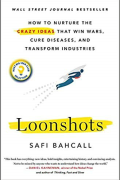My Account
Subscriptions
Summary Categories
Summary Collections
- Career & Life Satisfaction Collection
- Disruptive Innovation Collection
- Exceptional Leadership Collection
- Great Employees Only Collection
- Hidden Gems Collection
- Marketing Collection
- Must-Read Books for 2012 v1
- Must-Read Books for 2012 v2
- Must-Read Books for 2013
- Self-Help Collection
- Small Business Collection
- Strategic Assessment Collection
- Strategic Genius Collection
- Take Charge Collection
- Team Management Collection
- Ultimate Sales Collection
- Web Marketing Collection
Summary List
Loonshots:How to Nurture the Crazy Ideas That Win Wars, Cure Diseases, and Transform Industries
Safi Bahcall
Summarized September 2019
Type: [SUMMARY]
SKU: 9191
ISBN: 1250185963
Price: $12.50
Available Formats:






Purchase Summary
Summary Description
In this book, the author defines a loonshot as an idea that is widely dismissed and ridiculed. Loonshots is divided into three parts. In part one, Bahcall highlights several people who attempted loonshots and succeeded. In part two of the book, he discusses the science behind phase transitions and the importance of understanding sudden changes in group behavior. The final part of the book is an analysis of how loonshot ideas have influenced world history and the impact this has had on modern society.
In his book, Loonshots: How to Nurture the Crazy Ideas That Win Wars, Cure Diseases, and TransformIndustries, Safi Bahcall defines a loonshot as an idea that is widely dismissed and ridiculed. Loonshots is divided into three parts.
In part one, Bahcall highlights several people who attempted loonshots and succeeded. He mentions notable characters such as Steve Jobs, Edwin Land, and Juan Trippe, who generated loonshots that revolutionized their respective industries. However, some of these innovators fell into a trap that ultimately bankrupted their companies. He explains how organizations can avoid this trap and keep generating new ideas.
In part two of the book, he discusses the science behind phase transitions and the importance of understanding sudden changes in group behavior. He provides a technique that can help predict the point at which a company will transition from embracing loonshots to rejecting them. With this kind of knowledge, it is possible to predict when wildfires, traffic jams, and even terrorist attacks will occur.
The final part of the book is an analysis of how loonshot ideas have influenced world history and the impact this has had on modern society.
 Member Log In
Member Log In